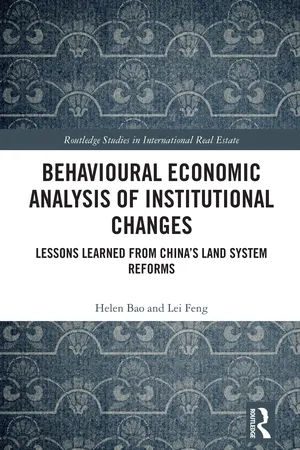
- English
- ePUB (mobile friendly)
- Available on iOS & Android
About this book
This book examines the evolution of China's rural land system through an integrated lens of institutional and behavioural economics. It traces seventy years of reform, from collective farming to market-oriented land transfers, to explain how central policy, local implementation and farmers' responses interact to shape institutional change. Moving beyond standard accounts focused on property rights and transaction costs, the book introduces a dynamic framework based on Prospect Theory, incorporating cognitive biases, social norms and bounded rationality. Drawing on two large-scale rural household surveys, the book combines empirical analysis with historical case studies to explore how reforms were received, adapted and resisted.
This book will benefit researchers, policymakers and graduate students interested in institutional change, land policy or Chinese rural development. It offers new tools to understand policy implementation in environments marked by uncertainty, decentralisation and informal constraints. By highlighting how behavioural factors mediate formal rules, the book provides insights that extend beyond China, informing the design of effective land and property rights reforms globally.
Frequently asked questions
- Essential is ideal for learners and professionals who enjoy exploring a wide range of subjects. Access the Essential Library with 800,000+ trusted titles and best-sellers across business, personal growth, and the humanities. Includes unlimited reading time and Standard Read Aloud voice.
- Complete: Perfect for advanced learners and researchers needing full, unrestricted access. Unlock 1.4M+ books across hundreds of subjects, including academic and specialized titles. The Complete Plan also includes advanced features like Premium Read Aloud and Research Assistant.
Please note we cannot support devices running on iOS 13 and Android 7 or earlier. Learn more about using the app.
Information
Table of contents
- Cover
- Half Title
- Series
- Title
- Copyright
- Contents
- 1 Introduction
- 2 New Institutional Economics and Behavioural Economics
- 3 A Theoretical Framework for China’s Rural Land Institutional Reform
- 4 Seventy Years of China’s Rural Land Institutional Reforms
- 5 Government Behaviour in Land Use Right Reform I: Household Responsibility System Reform
- 6 Government Behaviour in Land Use Right Reform II: No Land Reallocation Reform
- 7 Farmers’ Attitudes and Expectations: No Land Reallocation Reforms
- 8 Farmers’ Behaviour in Land Use Right Reform: Decision Biases in Land Transfer Pricing
- 9 Farmers and Governments in Land Use Right Reform: The Role of Social Capital
- 10 Land Transfer Right Reform I: Balancing Efficiency and Equity
- 11 Land Transfer Right Reform II: The Three Pilots Reform
- 12 Conclusions
- Index